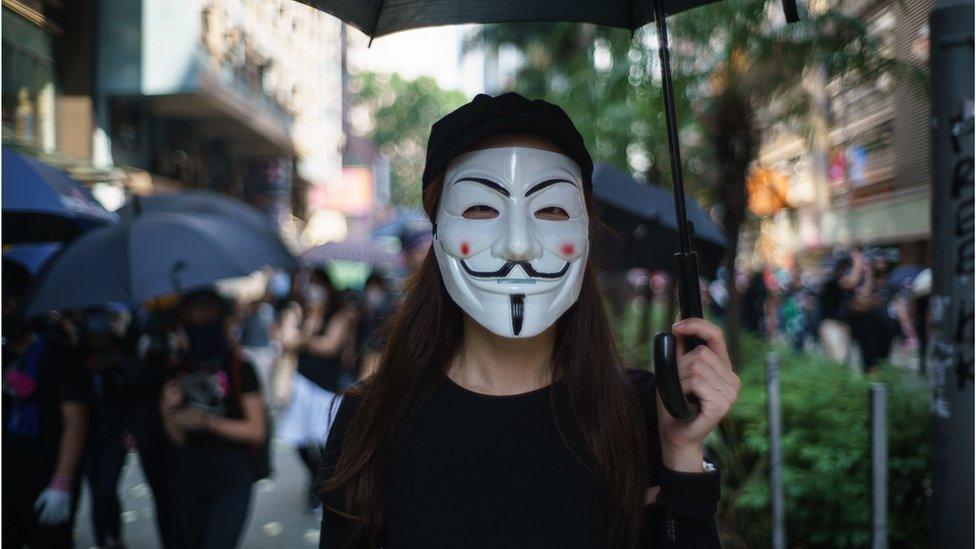Hong Kong protests: Authorities to announce face mask ban
- Published

Hong Kong's government is set to announce a ban on wearing face masks at public gatherings, local media report.
Officials plan to use emergency legislation dating from the colonial era to invoke the measure, aimed at quelling anti-government protests.
The legislation, called the Emergency Regulations Ordinance, has not been used for over 50 years.
Hong Kong's protests started in June, sparked by proposals to extradite suspected criminals to mainland China.
Critics feared this could undermine the city's judicial independence and endanger dissidents.
The face mask ban is expected to be announced on Friday after a meeting of the Executive Council in which emergency laws are likely to be enacted, local TV channel TVB reported.
The laws would grant Hong Kong's leader, Carrie Lam, the authority to "make any regulations whatsoever which he [or she] may consider desirable in the public interest" in case of "emergency or public danger".
Last used in 1967 to help stop violent riots in the territory's trading hub, the laws could also give the government greater authority to make arrests, censor publications and search premises. , external
In recent weeks, the unrest has taken a more violent turn. An Indonesian journalist has been left permanently blinded in her right eye by a rubber bullet said to have been fired by police on Sunday. On Tuesday, an 18-year-old protester was wounded when a police officer fired a live bullet into his chest.
Footage of the shooting shows the police officer fire one bullet at close range
Face masks are often worn by protesters to help prevent them from being identified and arrested by authorities.
In the recent Hong Kong protests, police have used water cannon to spray blue dye on demonstrators to make it easier to identify them later.

What will this change?
By Martin Yip, BBC News Chinese, Hong Kong
We don't yet know the contents of the rumoured emergency legislation, but protesters are already putting themselves on "high alert" in anticipation of Friday's announcement. Some are still calling for flash mob protests on Thursday evening to go head, showing how defiant they remain.
The Civil Human Rights Front, which has organised a few peaceful "mega-marches" over the last four months, argues the police should, in fact, be the first to be banned from wearing masks. That would mean officers could be held accountable for any abuse of power. Police in Hong Kong have repeatedly denied allegations of brutality.
Of course, there are many questions about how this ban would affect the protests. It is also unclear how the overstretched police would carry it out.
Nonetheless, it seems as though it will be good news for officers. However, one of their trade unions wants restrictions to be taken even further: it is insisting a curfew is imposed.

Why has the unrest turned violent?
Opponents of the proposed extradition law thought it would put Hong Kongers at risk of unfair trials and, in July, Carrie Lam said the law "was dead".
Despite this, protesters feared the bill could be revived, so demonstrations continued, calling for it to be withdrawn completely. The bill was finally withdrawn in September.
But clashes between police and protesters had already created their own momentum, and authorities continue to try to crack down on the unrest.
The 96 people, mostly students, who had been arrested on Sunday have already appeared in court charged with rioting. The injured 18-year-old protester has been charged with rioting and assaulting an officer.
The protests have been spared by wider discontent too. Recent years have seen growing opposition to the perceived encroachment of Beijing on Hong Kong's politics and threats to local identity.
How did we get here?
Until 1997, Hong Kong was a British territory. Since then, it has been part of China - but with its own system of law and government, known as One Country, Two Systems.
How Hong Kong got trapped in a cycle of violence
Hong Kong has its own judiciary and a separate legal system. Rights including freedom of assembly and freedom of speech are protected.
But those freedoms - the Basic Law - expire in 2047. It is not clear what Hong Kong's status will be then.